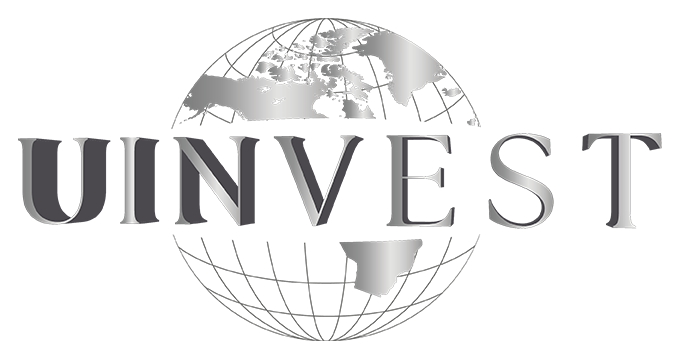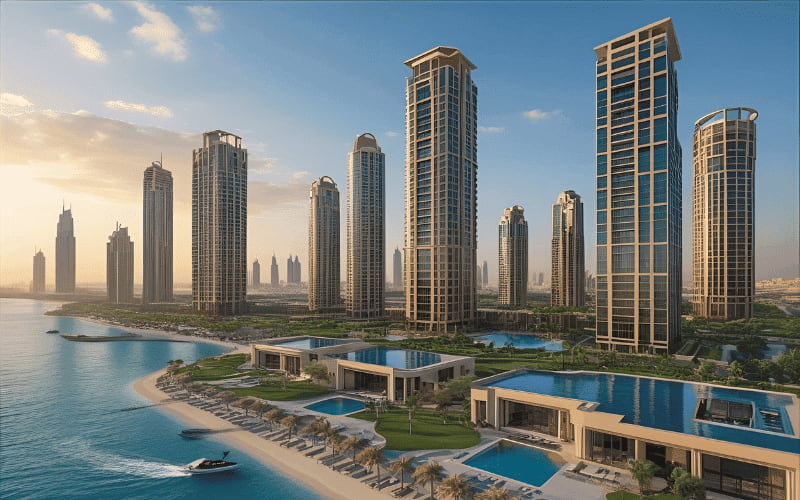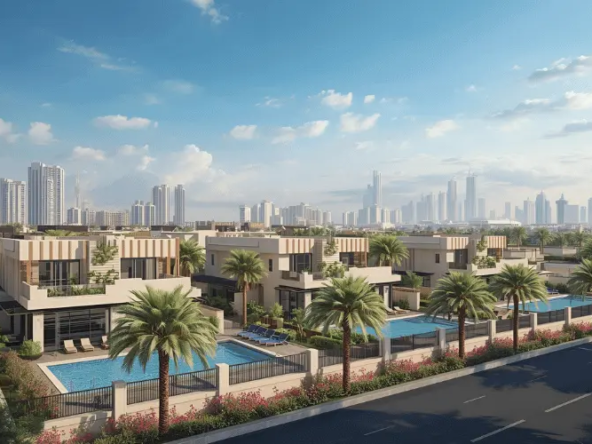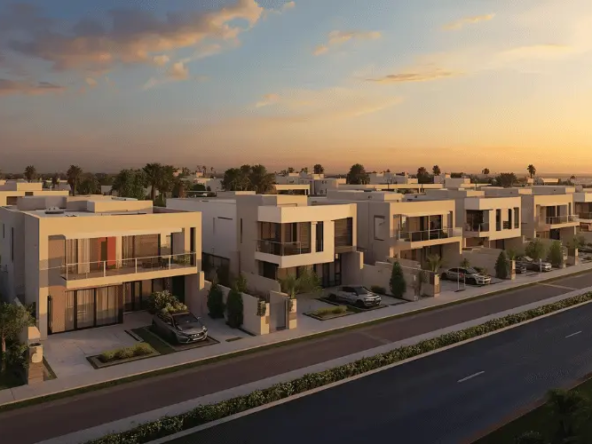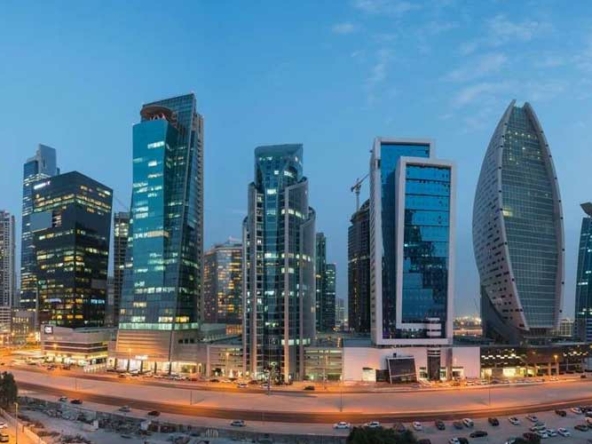Dubai’s property market is a growing sector that caters to both luxury investors and buyers with limited budgets. Despite an average annual price increase of 5–10%, affordable opportunities remain available in emerging communities, with starting prices from around AED 300,000.
For budget-conscious buyers, projects under development and flexible payment plans provide easier access to the market. With housing supply expected to rise in 2025–2026, these factors make investing in Dubai’s real estate even more appealing and potentially profitable.
Explore your options today—contact Uinvest Group to find the perfect property for your budget.
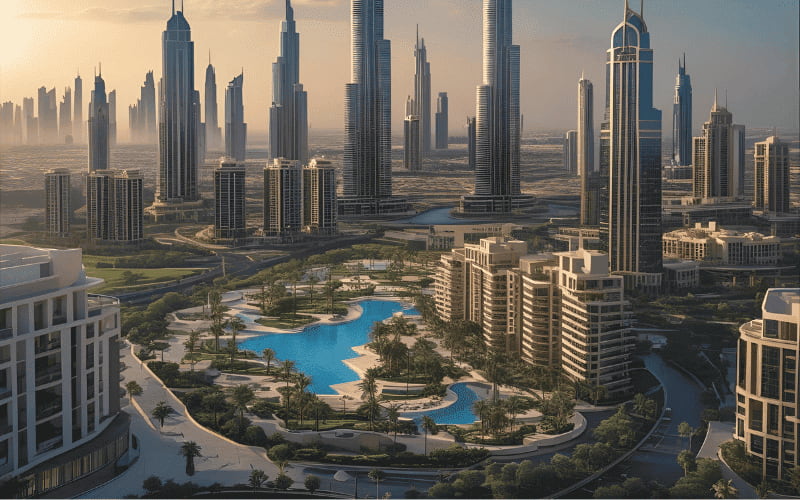
Understanding Dubai’s Property Market in 2025
After a red-hot 2024, where residential sales prices surged by up to 20%, the market is still growing this year—but with a noticeable shift. Developers are moving away from ultra-luxury projects and focusing more on affordable and mid-range properties to meet rising demand from first-time buyers and expats. This is a golden moment if you’ve been dreaming of owning in Dubai without breaking the bank.
Rental yields remain a strong pull—hovering between 5% and 8%, and the market’s stability is strengthened by the legacy of Expo 2020 and the latest visa reforms. However, with over 210,000 new units expected by 2026, savvy buyers (like you!) should keep an eye on price corrections—especially in non-prime locations.
Why Dubai Property Still Makes Sense in 2025
- High rental returns: 5–8% yields can mean solid passive income.
- Zero property or capital gains taxes: More profit stays in your pocket.
- Golden Visa eligibility: Invest over AED 750,000 and gain long-term residency benefits.
- Strong growth drivers: Expanding infrastructure and a robust economy are lifting property values.
What to Watch Out For
- Market volatility: Prices can swing with economic shifts.
- Oversupply risks: Certain areas may see slower appreciation.
- Luxury upkeep costs: Service fees in high-end developments can be steep.
- Economic dependency: Tourism and oil trends can impact overall stability.
Key Trends I’m Seeing for Budget Buyers
- Affordable housing boom: Mid-range homes under AED 1 million, especially studios and apartments in secondary areas, are becoming hot picks. In Q1 2025, prices in this segment rose 15.8% year-on-year.
- Post-pandemic momentum: Rental growth is easing to around 8.5% by mid-2025, but yields of 6–7% remain realistic in budget-friendly zones thanks to new infrastructure like airport expansions.
- Visa incentives: Owning a property worth AED 750,000+ gets you closer to that coveted Visa.
- Shift from luxury: Developers are cutting back on mega-luxury launches to serve the wider market.
From my perspective, 2025 is a fantastic year to explore Dubai’s affordable property opportunities. If you’re strategic—choosing emerging neighborhoods, watching supply trends, and leveraging payment plans—you could secure a property that not only fits your budget but also grows in value.
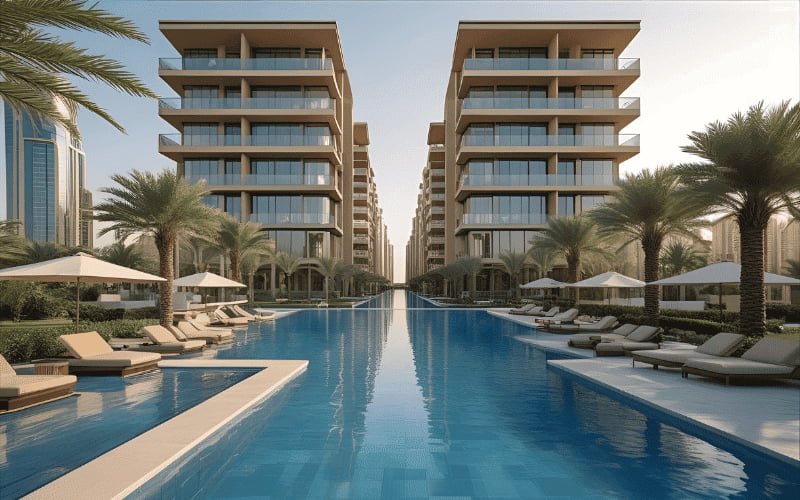
How to Buy Property in Dubai – Step-by-Step Guide for 2025
After exploring Dubai’s neighborhoods—from glamorous waterfronts to up-and-coming budget-friendly areas—I can confidently say buying property here isn’t as daunting as it seems. Thanks to the Dubai Land Department (DLD) and the game-changing 2002 Freehold Law, foreigners now enjoy full ownership rights in designated zones.
For budget-conscious buyers, the smartest approach often starts with off-plan properties, which significantly reduce upfront costs. And if you’re prepared, the entire process can wrap up in as little as 4–6 weeks.
To make your journey smooth and secure, partnering with a reputable agency like Uinvest Group—an international real estate firm active in the UAE, Oman, Turkey, Cyprus, and Greece—is a game changer. They specialize in guiding buyers through Dubai’s property market with professionalism and local expertise.
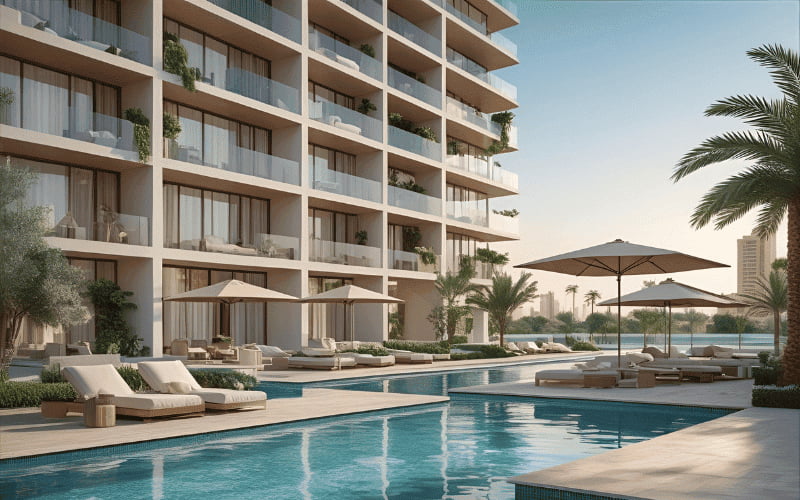
Step 1: Define Your Goals and Budget
Whether you want to invest, earn rental income, or live in the property yourself, your goal will determine the ideal location and property type. Be sure to consider additional costs such as fees and maintenance.
If your budget is under AED 1 million, Uinvest Group can help you find the perfect property.
Step 2: Choose Between Ready and Upcoming Properties
Pros:
- Lower entry prices – often 10–20% cheaper than completed units.
- Flexible payment plans (e.g., 50/50 splits).
- Potential for capital appreciation during development.
- Customization options and brand-new amenities.
Cons:
- Risk of construction delays or changes in quality.
- Market value uncertainty until handover.
- No immediate occupancy or rental income.
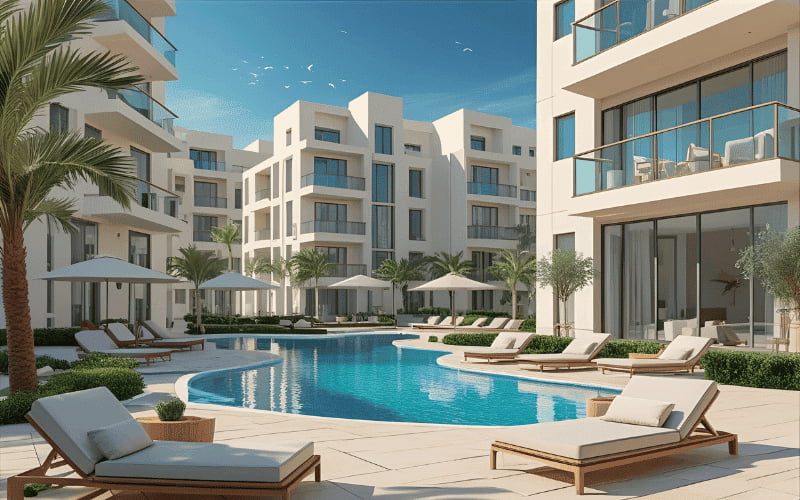
Step 3: Select the Right Area and Property
Focus on affordable neighborhoods with strong growth potential. Working with a RERA-registered real estate agent is crucial, and Uinvest Group offers expert local knowledge and negotiation skills to find your perfect home at the best price.
Step 4: Secure Financing (If Needed)
Non-residents can obtain mortgages covering up to 50% of the property’s value from UAE banks, typically at interest rates around 4–5%. Prepare your passport, proof of income, and bank statements for pre-approval. Uinvest Group can assist you in navigating financing options and lender requirements.
Step 5: Make an Offer and Sign Agreements
Once you’ve found your ideal property, submit a Memorandum of Understanding (MOU) with a 10% deposit. Next, sign the sales contract and get ready for the final steps. Uinvest Group ensures all legal documents and contracts are carefully handled to protect your interests.
Step 6: Complete the Transfer
Finalize payment, register the transaction at the DLD, and receive your title deed—official proof of ownership in Dubai. With Uinvest Group’s support, this step is seamless and stress-free.
From my experience, whether you choose Upcoming Properties for flexible payments or ready-to-move units for immediate returns, success depends on thorough research, patience, and working with a trustworthy agency.
For me, Uinvest Group is that trusted partner, guiding you every step of the way to turn your Dubai property dreams into reality—without overspending.
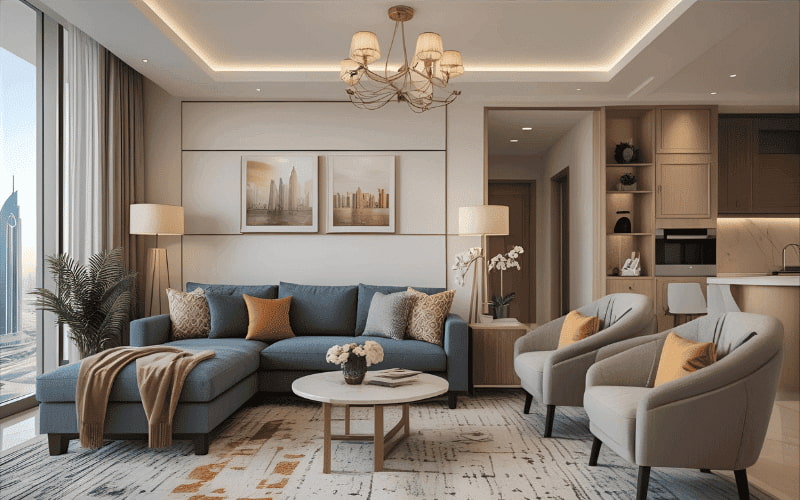
Budget-Friendly Areas to Consider in Dubai in 2025
Exploring Dubai’s real estate market in 2025, I’ve found that beyond the central luxury hubs, several emerging and established communities offer outstanding value for buyers on a budget. Prices range roughly from AED 1,100 to AED 1,400 per square foot, and these areas enjoy solid rental demand and strong potential for capital appreciation, especially after Q1 2025’s record off-plan sales.
Here’s a comprehensive list of budget-friendly neighborhoods worth your attention this year:
1. Jumeirah Village Circle (JVC)
A vibrant, family-focused community with studios starting at AED 400,000 and 1-bedroom apartments priced between AED 600,000 and AED 800,000. It offers attractive rental yields around 6–7%, parks, schools, and a friendly community atmosphere.
Pros:
- Affordable prices and high rental yields
- Family-friendly with green spaces
- Growing community potential
Cons:
- Limited modern infrastructure in parts
- Traffic congestion during peak times
- Construction noise due to ongoing projects
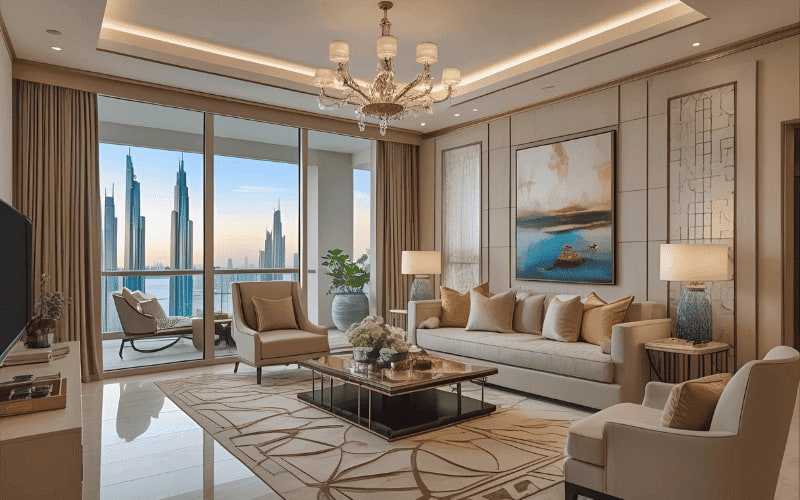
2. International City
Dubai’s multicultural and highly affordable community with apartments from AED 300,000, ideal for rental investments targeting diverse tenants such as workers and expats.
Pros:
- Lowest entry costs in Dubai
- Diverse community
- Consistent rental demand
Cons:
- Basic infrastructure and amenities
- Located far from Dubai’s core, longer commutes
- Lower appreciation rates
3. Arjan
Close to Dubai Miracle Garden, Arjan offers modern apartments from around AED 500,000. The area benefits from excellent road access and is quickly gaining investor interest.
Pros:
- Emerging hotspot with new developments
- Near attractions
- Good highway connectivity
Cons:
- Still under construction
- Limited public transport
- Higher service fees in new buildings
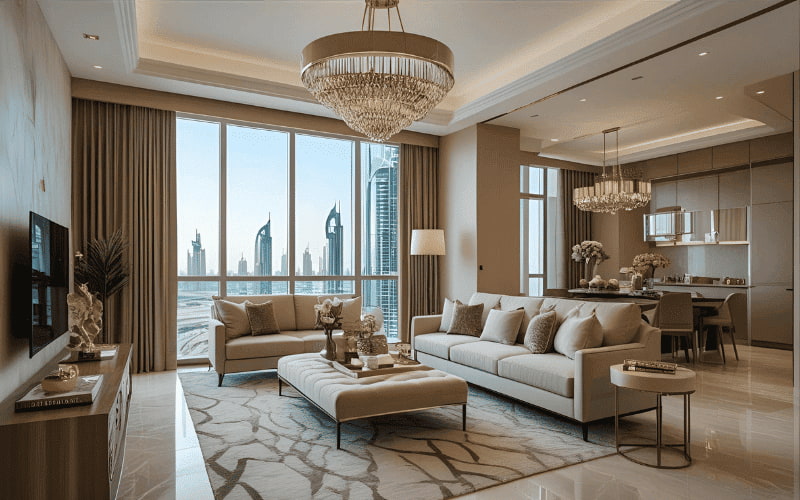
4. Dubai South
A logistics and aviation hub with properties under AED 700,000, driven by growth from the nearby airport and industrial zones.
Pros:
- Growth linked to airport and logistics
- Affordable townhouses and apartments
- Strong rental yields
Cons:
- Industrial feel, fewer amenities
- Longer commute times
- Market tied to global trade cycles
5. Dubai Production City
Situated next to industrial zones, apartments here start at AED 600,000 with good connectivity to business districts.
Pros:
- Competitive prices
- Close to business hubs
- Steady rental income potential
Cons:
- Industrial surroundings
- Noise and pollution risks
- Slower appreciation
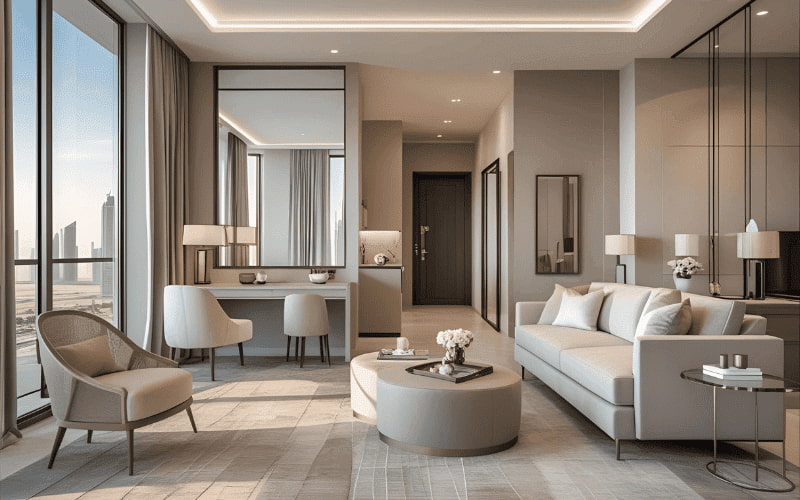
6. Dubai Silicon Oasis (DSO)
A tech-focused free zone offering affordable apartments and villas starting from AED 500,000. It has good amenities, schools, and a growing community.
Pros:
- Modern infrastructure and tech hub status
- Family-friendly amenities
- Strong rental demand from professionals
Cons:
- Slightly away from the main city center
- Some areas still developing
7. Town Square
A newer development offering affordable villas and townhouses starting around AED 700,000, popular with families looking for suburban living.
Pros:
- Spacious homes with modern design
- Family-oriented community with parks and schools
- Good potential for capital growth
Cons:
- Distance from Dubai’s main business districts
- Fewer public transport options
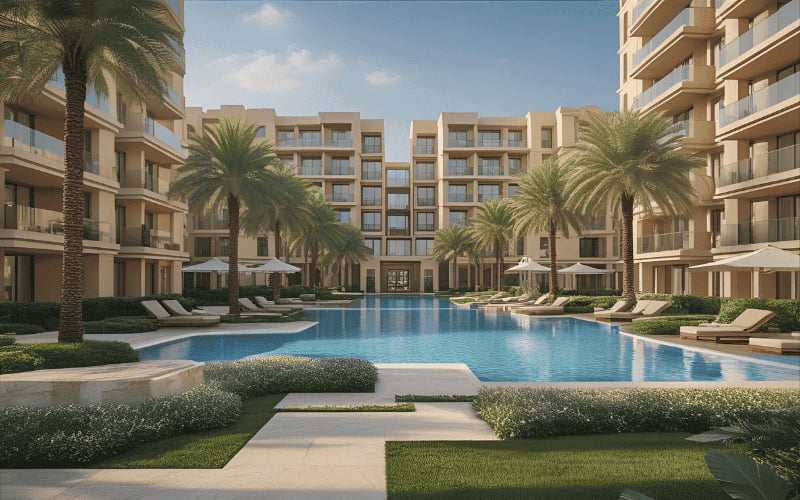
8. Al Warsan Village
An affordable community with villas and townhouses starting at AED 600,000, ideal for buyers seeking quiet residential neighborhoods.
Pros:
- Competitive pricing
- Family-friendly atmosphere
- Quiet, suburban feel
Cons:
- Limited retail and entertainment options nearby
- Longer commute to city center
| Area | Starting Price (AED) | Property Types | Key Advantages | Average Yield (%) |
| Jumeirah Village Circle (JVC) | 400,000 | Studios, 1-2 BR Apartments | Community parks, family-friendly | 6-7 |
| International City | 300,000 | Apartments | Diverse community, lowest entry | 5-6 |
| Arjan | 500,000 | Modern Apartments | Attractions nearby, great access | 6-8 |
| Dubai South | 600,000 | Townhouses, Apartments | Airport growth, logistics hub | 7 |
| Dubai Production City | 600,000 | Apartments | Industrial access, good value | 5-7 |
| Dubai Silicon Oasis | 500,000 | Apartments, Villas | Tech hub, family-friendly | 6-7 |
| Town Square | 700,000 | Villas, Townhouses | Spacious homes, family-oriented | 6-8 |
| Al Warsan Village | 600,000 | Villas, Townhouses | Quiet, affordable suburban area | 5-6 |
These areas offer great entry points for buyers on a budget, blending affordability with solid rental yields and growth potential. If you want to navigate Dubai’s property market smartly, working with a reliable agency like Uinvest Group ensures expert guidance tailored to your budget and preferences.
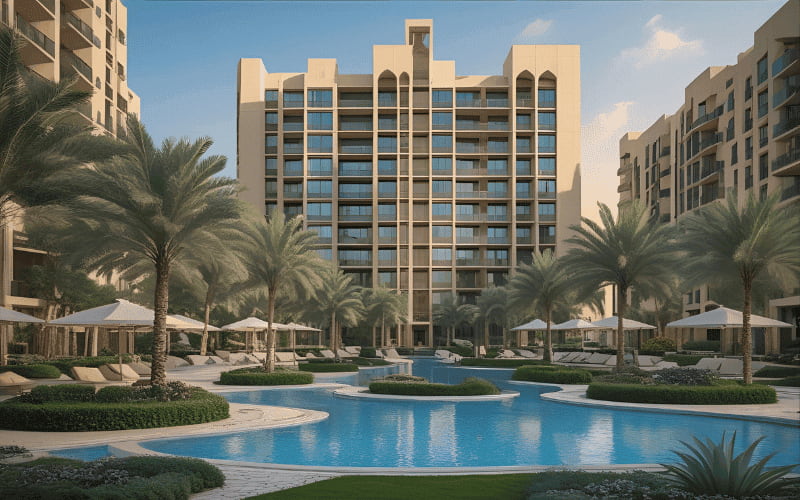
Financing Options for Low-Budget Buyers in Dubai 2025
Navigating Dubai’s property market on a budget means understanding the financing landscape deeply. With competitive bank rates, flexible developer plans, and innovative fractional ownership models, there are several pathways to suit different financial situations. Here’s a detailed breakdown of each option, highlighting key benefits and important considerations to keep in mind.
Bank Mortgages
Benefits:
- Access to Larger Loans: Mortgages allow buyers to finance significant portions of a property’s price—up to 75% for residents and 50% for non-residents—making higher-value properties more attainable.
- Lower Interest Rates Over Time: Generally, bank loans offer relatively low fixed or variable rates (around 4–5%), which can reduce your overall borrowing costs compared to other financing methods.
- Building Credit and Equity: Regular mortgage payments help build your credit history and increase your equity stake in the property, which is valuable for future investments or refinancing.
Considerations:
- Strict Eligibility Requirements: Banks require thorough documentation including income proof, credit checks, and often a minimum salary threshold, which can be challenging for some buyers to meet.
- Interest Rate Fluctuations: Variable rates may increase over time, impacting monthly repayments and overall affordability if not carefully managed.
- Risk of Foreclosure: Missing payments can lead to severe consequences such as foreclosure, which means losing your property and damaging your credit.
Developer Payment Plans
Benefits:
- Flexible, Interest-Free Payments: Many developers offer staggered payment plans, often requiring as little as 1–2% per month over 3 to 5 years. This eases cash flow and removes the pressure of large upfront costs.
- Payments Aligned with Construction: Your payments correspond with the project’s progress, reducing risk and giving you time to prepare financially for final settlement.
- Attractive for First-Time Buyers: These plans make it easier for buyers new to the market or with limited capital to enter without heavy reliance on bank loans.
Considerations:
- Potentially Higher Overall Costs: While interest-free, developers sometimes add premiums or fees that can increase the total amount paid compared to cash purchases.
- Dependent on Developer Reliability: Delays or project cancellations can pose risks, so working with reputable developers and agencies is crucial.
- Limited to Specific Projects: These payment schemes are usually only available on selected off-plan developments, limiting choices.
Fractional Ownership & Crowdfunding Platforms
Benefits:
- Low Capital Requirement: You can start investing with as little as AED 500 by purchasing shares in a property, which is ideal for small investors or those wanting to diversify their portfolio.
- Diversification Across Properties: Spreading investments over multiple properties reduces risk and exposure to any single market fluctuation.
- Passive Income Stream: Crowdfunding platforms handle management and tenant issues, allowing you to earn rental income without direct involvement.
Considerations:
- Reduced Liquidity: Selling your share isn’t always straightforward, so be prepared for potentially limited ability to cash out quickly.
- Platform Fees: Management and service fees charged by the platform can reduce net returns.
- Shared Market Risks: Your investment performance depends on the overall market and the other co-investors, limiting individual control.
Currency Exchange & Transfer Services
When funding your purchase from abroad, minimizing transfer fees is crucial. Services like Wise provide transparent, low-cost currency exchange and international transfers, helping you keep more of your money invested in the property.
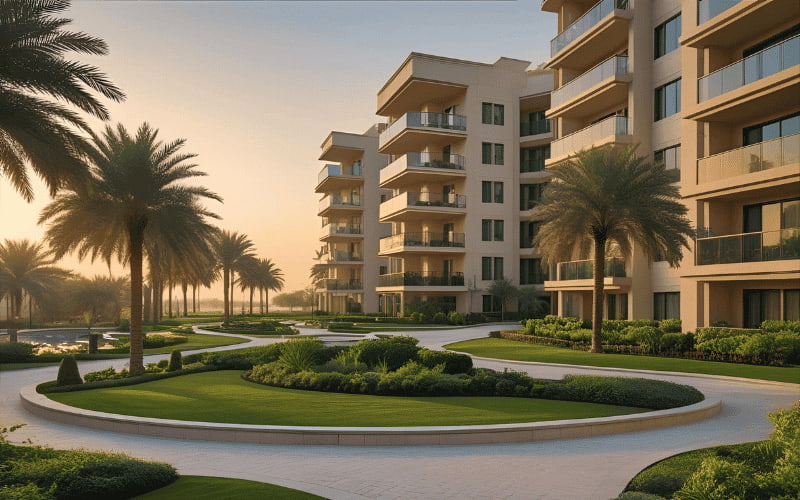
Practical Tips for Budget Buyers Using Financing
- Calculate Affordability Early: Use online mortgage calculators and budgeting tools to understand monthly payments and total costs before committing.
- Consider Combining Financing Options: For example, a smaller mortgage plus a developer payment plan can balance risk and cash flow.
- Research Developer Reputation: Always verify the developer’s track record and project timelines to reduce risks associated with off-plan purchases.
- Prepare Documentation: Organize your passport, proof of income, bank statements, and credit reports to speed up loan approvals.
- Work with a Trusted Agency: Partnering with experts like Uinvest Group ensures you get tailored financing advice and access to the best deals for your budget.
From my journey through Dubai’s vibrant property market, I’ve learned that understanding your financing options deeply and planning carefully is the key to turning your real estate ambitions into reality—without overstretching your finances.
Understanding Extra Costs When Buying Real Estate in Dubai
Buying property in Dubai is an exciting journey, but it’s crucial to budget beyond just the purchase price. Additional costs and fees typically add 6-10% on top of your property’s value. Knowing these expenses upfront helps you avoid surprises and plan smartly in Dubai’s transparent—but fee-structured—real estate market.
Here’s a clear breakdown of the key fees you should expect:
| Cost Type | Percentage / Amount | Notes |
| Dubai Land Department (DLD) Transfer Fee | 4% of property value | Mandatory for all property transfers |
| Agent Commission | Typically 2% | Usually negotiable or shared between buyer and seller |
| Mortgage Registration Fee | 0.25% of property value + bank processing fees | Applies only if you use financing |
| No Objection Certificate (NOC) & Admin Charges | AED 5,000 – 10,000 | Varies depending on developer and utilities |
| Maintenance / Service Charges | AED 10 – 20 per sq. ft. annually | Covers community upkeep and services |
| Other Fees | AED 2,500 – 3,500 (valuation and insurance) | Sometimes required for mortgage or registration |
Why These Costs Matter
- DLD Transfer Fee (4%) is a fixed government charge required to register ownership officially.
- Agent Commission (around 2%) can often be negotiated and sometimes split between buyer and seller, so it’s worth discussing upfront.
- Mortgage registration fees only apply if you’re taking a home loan, but bank fees and paperwork costs should be considered.
- NOC and admin fees cover essential paperwork like certificates confirming the property has no outstanding issues, plus utility connection fees.
- Maintenance fees vary by community and property size but cover ongoing upkeep, security, and shared facilities.
- Valuation and insurance fees are additional costs that might be mandatory if you’re financing or for added protection.
Planning Your Budget
Factoring in these fees means you should set aside 6-10% extra beyond your property’s purchase price as a financial buffer. This way, you stay well-prepared for all legal and administrative costs and avoid any last-minute surprises.
If you’re looking to buy property in Dubai and want expert advice to navigate these costs smoothly, partnering with a trusted agency. They help you understand every fee upfront and find the best deals tailored to your budget.
Uinvest Group Helps You Buy Property in Dubai
In 2025, buying property in Dubai on a budget is more accessible than ever. Smart strategies like investing in off-plan projects within affordable neighborhoods, combined with flexible financing options, can help you enter the market confidently—even as supply growth may bring price adjustments. With strong rental yields and rising demand for mid-range homes, now is a prime time for first-time buyers and budget-conscious investors to secure valuable assets with promising growth.
Uinvest Group supports you throughout the process, providing expert guidance and access to properties across five countries including the UAE.
You might also find these articles helpful:
Frequently Asked Questions ( FAQs)
What is the minimum budget required to buy a property in Dubai in 2025?
You can find properties starting from around AED 300,000, especially in emerging communities like International City and Jumeirah Village Circle.
Are there affordable neighborhoods in Dubai suitable for first-time buyers?
Yes, areas like Jumeirah Village Circle (JVC), International City, Arjan, Dubai South, and Dubai Silicon Oasis offer budget-friendly options with good growth potential.
What types of properties are best for buyers with limited budgets?
Studios and one-bedroom apartments, especially Upcoming Properties, are popular affordable choices.
What are Upcoming Properties, and are they a good option for budget buyers?
They are those still under construction. They usually have lower entry prices and flexible payment plans but come with risks like construction delays.
Can foreigners buy property in Dubai, and do they have full ownership rights?
Yes, thanks to Dubai’s 2002 Freehold Law, foreigners can fully own properties in designated freehold areas.
What additional costs should I expect when buying a property in Dubai?
Apart from the purchase price, budget for around 6-10% extra, including Dubai Land Department fees, agent commissions, mortgage registration fees, and maintenance charges.
Are there financing options available for buyers on a low budget?
Yes, you can get mortgages covering up to 50% of the property value for non-residents, developer payment plans, and even fractional ownership options.
What rental yields can I expect from budget properties in Dubai?
Rental yields in affordable areas typically range between 5% and 8%, making them attractive for investment.
How long does the property buying process take in Dubai?
The process can take as little as 4–6 weeks, especially when buying off-plan or ready properties with professional agency support.
What role do real estate agencies play in helping budget buyers?
Agencies like Uinvest Group provide expert advice, access to trusted listings, negotiation skills, and help navigate financing and legal paperwork to ensure a smooth buying experience.
